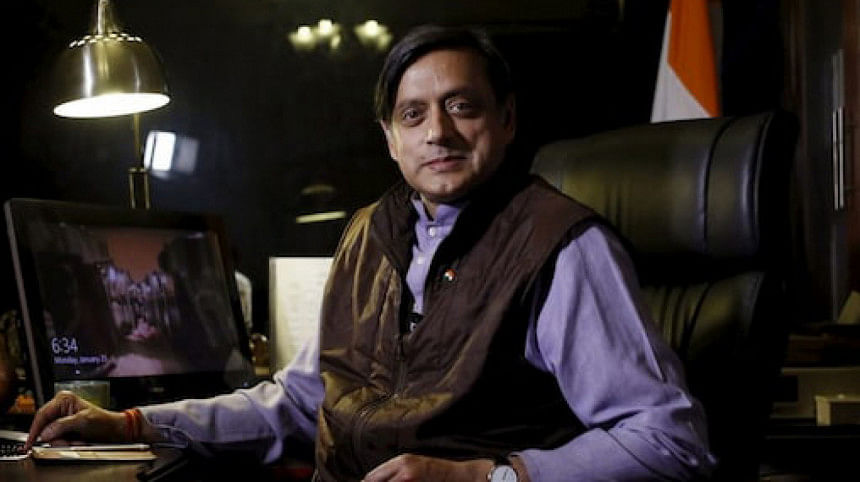Change of guard in Bangladesh not a cause for worry for India

Senior Congress leader Shashi Tharoor today said the change of guard in Bangladesh is not a cause for worry for India.
Asked by NDTV about his views on how the developments in Bangladesh would impact its ties with India, he said, "Our fundamental interest lies in close and friendly relations with Bangladesh. Our basic commitment is to the well-being of Bangladeshi people. The state comes second, and any individual leader comes third."
"We are with the people of Bangladesh. We were with them in 1971, and we have been with them through thick and thin. Even when they had governments who were less than friendly to us, we have managed to keep our relationship on an even keel, and certainly, there should be no deterioration in that relationship in time to come," he added.
On the interim government headed by Nobel Laureate Muhammad Yunus, he said there's no cause for anxiety for New Delhi.
"I know Muhammad Yunus personally. He is a highly respected figure. I suppose he is somewhat close to Washington rather than being seen as close to Jamaat e Islami or Pakistani ISI. If you look at the overall composition of the interim government, there doesn't seem to be any particular reason for India to feel any anxiety about countries hostile to us having put their stamp on this interim government," he said.
The big concern for India, Tharoor said, has always been whether Pakistan and China will fish in troubled waters.
"In this kind of context, there is always a possibility that the Pakistani ISI could have had a hand in some outrageous incidents of violence during the agitation or that the Chinese, who have a strong presence in Bangladesh, might have seen this as an opportunity to expand their influence. Those are the things people watching on the subcontinent are most concerned about. But certainly, there is no implication of anything in the composition of the interim government or the initial statements of Yunus that would give us any cause for worry," he said.
On India giving refuge to Sheikh Hasina following her ouster, Tharoor lauded the Indian government. "If we had not helped her, it would have been a disgrace for India. Nobody would have wanted to be our friend if we had treated our friend badly. Sheikh Hasina is a friend of India and India is a friend of her. And when a friend is in trouble, you don't look twice before you help them; keep them safe. That's exactly what India has done. I applaud the government for doing it. I would have wanted nothing less. As Indians, we have certain standards we stand for in the world. The government has done the right thing to bring her here and ensure her safety," he said.
"How long she [Hasina] wishes to remain [here] is not on us. You don't call someone to your house and ask them when you are leaving. My view is that we wait and see how long she feels she can stay before she moves on. There are practical considerations before moving to any other country; there are visa considerations and other issues. For now, she is with us, and we should be proud of the fact that we have stood by a friend when her personal safety was in danger," Tharoor said.
Asked whether the Indian government should raise concerns regarding attacks on minorities, he said, "There certainly have been some attacks; no one can or should deny it. It's a fact. At the same time, there is no doubt that there are also stories coming out that Bangladeshi Muslims are guarding Hindu homes and temples, so there is a bit of good news amid all the bad news."
The Congress leader saw hope in Yunus' address after taking charge of the interim government.
"Prof Yunus said the government stands by the minorities and urged people to be calm and stop acts of violence. That's a very good sign. Any continuing violence will be definitely instigated by those elements in Bangladesh's society who have traditionally been anti-Indian, and anti-Hindu and will do whatever it takes to create the conditions of disorder that may give them the opportunity to fish in troubled waters. But for now, I don't believe there is any one authority who wants to see that situation continue," he concluded.
Meanwhile, Congress' communications chief Jairam Ramesh, in a recent post on X (formerly Twitter), urged the interim government to take strong steps to deal with the current situation.
"While noting that there have been influential voices within Bangladesh calling for the preservation of the country's multireligious heritage, the Indian National Congress expresses its concern at reports of targeted attacks on minorities there and their properties, and places of worship. The Indian National Congress hopes that the interim government in Bangladesh will take forceful steps to instil confidence in minority communities to lead their lives in an atmosphere of security, dignity and harmony," read his statement posted Saturday.

 For all latest news, follow The Daily Star's Google News channel.
For all latest news, follow The Daily Star's Google News channel. 








Comments